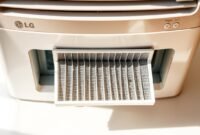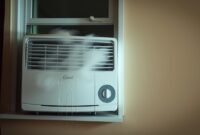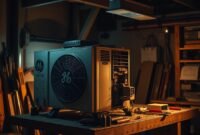Is your air conditioning fan not spinning? This can make your home feel like a sauna on hot days. Many people get frustrated when their ac fan stops working, worried about the cost of fixing it.
There are many reasons why an air conditioning fan might not spin. Issues like electrical problems or mechanical failures can cause this. I’ve seen how a small fan problem can quickly become a big HVAC issue.
But, the good news is that many fan problems have easy fixes. With the right knowledge, you might be able to solve your AC fan issue without needing expensive professional help.
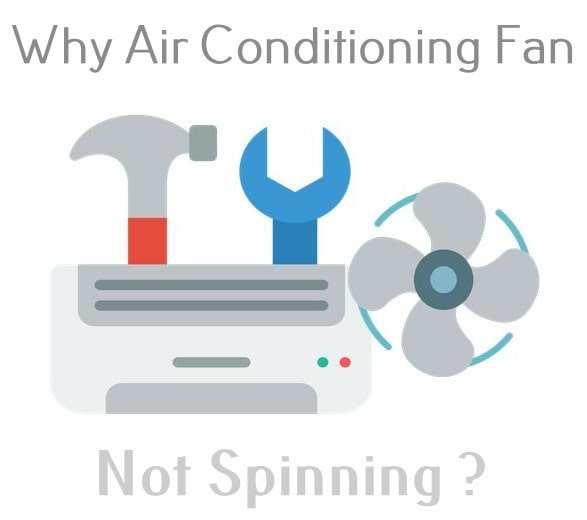
Understanding Your AC Fan System Components
Your home’s hvac system relies on fan components to keep you cool. I’ll explain the key parts that work together. They help circulate air and manage temperature in your home.
Your air conditioning system is more than one unit. It’s a complex network of parts. Most homes have two main fans that work together to keep your space comfortable.
Indoor Blower Fan Basics
The indoor blower fan is inside your furnace or air handler. It plays a vital role. Its main tasks are:
- Pushing cooled air through your home’s ductwork
- Circulating air across the cooling coils
- Maintaining consistent temperature distribution
Outdoor Condenser Fan Function
The outdoor condenser fan is in the exterior unit. It’s responsible for expelling heat. It works by:
- Releasing heat collected from inside your home
- Cooling refrigerant before it returns indoors
- Supporting the overall cooling cycle
How Capacitors and Motors Work Together
To understand air conditioner blower motor failure, you need to know about capacitors and motors. They’re like a team in your cooling system. Capacitors give the initial electrical boost, and motors turn that energy into motion.
A failing capacitor can cause big problems. It might make your fan stop working. Regular maintenance can prevent these issues and make your system last longer.
Signs Your Air Conditioning Fan Not Spinning Needs Attention
When my home wasn’t cooling down, I knew something was off. Finding out why your air conditioner fan isn’t working can be hard. But catching problems early can save you a lot of money.
It’s important to know when your HVAC fan stops spinning. This keeps your home comfortable. Here are signs your AC fan needs help right away:
- No cold air flowing through vents
- Unusual rattling sounds from the outdoor unit
- Outdoor fan blades rotating extremely slowly or not at all
- Intermittent AC system operation
- Warm air blowing from air registers
When you’re trying to figure out why your air conditioner fan isn’t working, listen and look closely. A fan that doesn’t move at all in your outdoor unit is a big problem.
| Warning Sign | Potential Issue | Recommended Action |
|---|---|---|
| Fan not spinning | Motor failure | Professional inspection |
| Loud grinding noise | Bearing problems | Immediate repair needed |
| Intermittent cooling | Electrical connection issues | Check electrical components |
Don’t ignore signs that your hvac fan has stopped spinning. Fixing problems quickly can stop bigger, more costly damage. Even small issues can turn into big problems if not fixed right away.
Power Supply Issues and Circuit Breaker Problems
Air conditioning fan motor issues often come from electrical problems. These might seem small but can really affect your system’s performance. When AC condenser fan problems appear, check the electrical system first.
Electrical connections are key to your air conditioning system’s smooth operation. I’ve seen many times how simple electrical issues can stop your AC from working.
Understanding Circuit Breaker Trips
Circuit breaker trips are more than just a hassle. They often signal air conditioning fan motor issues. Here are reasons why your breaker might trip:
- Overloaded electrical circuit
- Short circuit in the AC system
- Aging electrical components
- Faulty AC condenser fan problems
Read also: AC Trips Breaker After 5 Minutes?
Troubleshooting Electrical Connections
When you get a circuit breaker trip, follow these steps:
- Reset the circuit breaker carefully
- Check for any visible damage to electrical connections
- Ensure no other appliances are causing electrical strain
- Listen for unusual sounds from the AC unit
If the breaker keeps tripping, it’s time to call a pro. Repeated electrical issues might mean serious AC system problems that need expert help.
Remember, electrical problems aren’t just a hassle—they’re a safety risk. Always get a professional check when you’re not sure about your AC’s electrical issues.
Capacitor Failure: A Common Culprit
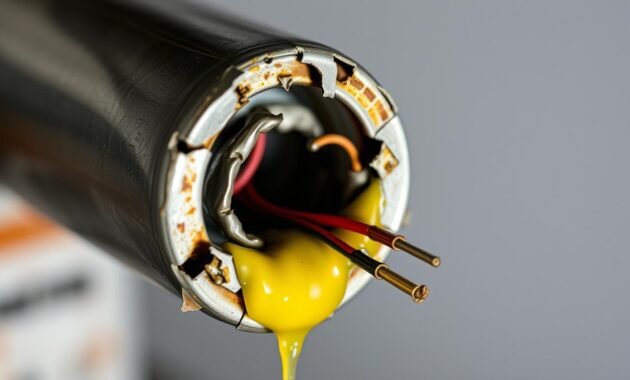
Capacitors are key in fixing non-spinning ac fan problems. Many homeowners don’t realize their importance. They power the fan motor in your air conditioning system.
A run capacitor gives the initial boost to start the AC’s fan motor. If it fails, you might notice:
- Strange humming sounds from the AC unit
- Fan motor struggling to start
- Inconsistent cooling performance
- Complete fan motor shutdown
Capacitor issues are common in air conditioner fan repairs. These components regulate electrical current but can wear out. This happens due to heat, electrical stress, and aging.
Spotting a bad capacitor needs a careful look. While some try to fix it themselves, I advise against it. Capacitors can be dangerous, holding charge even when off.
Professional HVAC technicians can quickly find and replace a bad capacitor. They ensure your AC works well again and avoid bigger problems.
Investigating Contactor Problems in Your HVAC System
When your air conditioning fan motor stops working, the contactor might be the hidden culprit in your hvac system. These electrical switches play a critical role in controlling your AC’s power distribution and fan operation.
Contactors are electrical switches that manage power flow to your air conditioning components. They work like traffic controllers, directing electricity to your fan and condenser unit when cooling is needed.
Understanding Contactor Functionality
In a typical hvac system, contactors perform several key functions:
- Control electrical current to the fan motor
- Manage power distribution to compressor
- Enable and disable cooling cycle
- Protect electrical components from overload
Recognizing Faulty Contactor Signs
Air conditioning fan motor issues often stem from contactor problems. Watch for these warning signals:
- Intermittent fan operation
- Buzzing or chattering sounds near the unit
- Fan running continuously
- Visual burn marks on the contactor
- Inconsistent cooling performance
Professional HVAC technicians recommend regular inspections to catch contactor wear before complete system failure occurs. Replacing a worn contactor can prevent more extensive and expensive repairs down the line.
Fan Motor Burnout and Bearing Issues
Preventing air conditioner blower motor failure is essential. Fan motors work hard to keep your home cool. But, they can wear out over time.
AC condenser fan problems often come from not maintaining them well. They can fail due to several reasons:
- Continuous high-stress operation
- Lack of regular lubrication
- Accumulated dust and debris
- Age-related mechanical degradation
Look out for signs that your fan motor might be failing:
- Unusual grinding or squealing noises
- Reduced airflow from vents
- Inconsistent cooling performance
- Frequent system cycling
| Motor Issue | Potential Consequence | Estimated Repair Cost |
|---|---|---|
| Bearing Wear | Reduced Efficiency | $200-$400 |
| Complete Motor Failure | System Replacement | $800-$2,500 |
| Electrical Burnout | Comprehensive System Damage | $1,500-$3,000 |
Regular maintenance can help your fan motor last longer. Get professional inspections every year. This can prevent expensive repairs.
The Impact of Dirty Air Filters on Fan Performance
Your air conditioning system needs clean air filters to work well. If you ignore air filter care, it can harm your HVAC system. This might lead to expensive fixes and less efficiency.
Dirty air filters are tough on your air duct system. When they get clogged, they block airflow. This makes your AC fan work too hard.
This extra effort can cause big problems:
- Reduced system efficiency
- Increased energy consumption
- Potential mold remediation risks
- Premature system wear and tear
Proper Air Filter Maintenance
I suggest checking your air filters every 30-90 days. This depends on your home’s conditions. Homes with pets, many people, or lots of dust need filters changed more often.
How Clogged Filters Affect System Operation
Clogged filters make your AC fan work too hard. This can even cause your system to fail. The blocked airflow puts too much stress on parts, raising the chance of breakdowns.
Keeping your air filters clean helps your HVAC system. It also improves the air inside your home. And, it could save you a lot of money on repairs.
Broken Fan Belts and Mechanical Failures
Broken fan belts can stop your AC fan from spinning. This is common in older AC models. They use belt-driven systems that wear out with time.
I’ve seen many cases where a worn-out belt stops the AC fan from spinning. These failures can happen for many reasons:
- Prolonged use and age of the AC unit
- Lack of regular maintenance
- Excessive friction and wear
- Environmental factors like dust and debris
To fix a non-spinning ac fan, check the belt for damage. Here are signs your fan belt needs attention:
- Visible cracks or fraying
- Unusual squeaking sounds
- Reduced air circulation
- Complete belt breakage
| Belt Condition | Recommended Action |
|---|---|
| Minor wear | Lubrication and adjustment |
| Significant damage | Complete belt replacement |
| Recurring issues | Consider AC unit replacement |
Some repairs are simple, like replacing the belt. But, if problems keep happening, it might be time for a new system. Always get a professional HVAC technician to check and fix these issues.
Frozen Evaporator Coil Effects on Fan Operation
A frozen evaporator coil can cause big problems for your air conditioning. It messes up the cooling process and can lead to health issues from mold spores.
The evaporator coil is inside your air handler unit. It takes heat and humidity out of the air. Several things can make it freeze:
- Dirty air filters blocking airflow
- Not enough refrigerant
- A broken indoor blower fan
- Blocked air vents
When the coil freezes, your AC can’t remove moisture well. This creates a perfect spot for mold spores to grow. These spores can cause breathing problems and allergies.
Read also: How to Stop Condensation on Air Vents?
Here are signs of a frozen coil:
- Warm air coming from vents
- Moisture around the unit
- AC not cooling right
- Ice on refrigerant lines
If you see these signs, get professional help. An HVAC expert can find and fix the problem. They’ll make sure your fan and cooling system work right again.
Professional Maintenance Tips for AC Fan Longevity
Keeping your air conditioning system in good shape is key to its long-term performance. It also helps avoid expensive repairs. As a homeowner, I’ve found that taking care of your HVAC system early on can save you a lot of trouble and money.
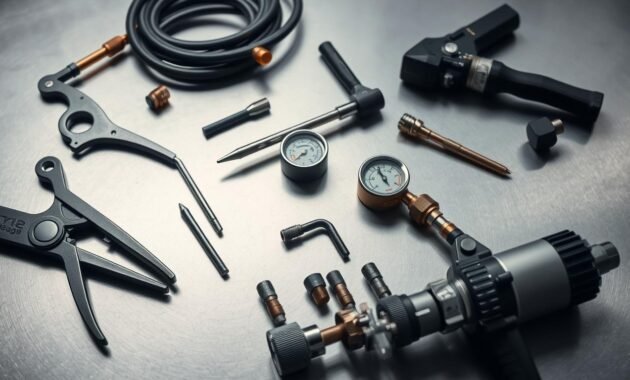
To protect your AC, you need a solid plan. Regular maintenance is essential. It includes several important steps to keep your system working well:
- Inspect your system’s components using specialized tools
- Clean or replace air filters every 1-3 months
- Check electrical connections and fan components
- Listen for unusual noises that might indicate problems
Creating a Maintenance Routine
It’s smart to set up a regular maintenance schedule. This helps avoid problems before they start. Here’s when you should do certain maintenance tasks:
| Maintenance Task | Frequency | Importance |
|---|---|---|
| Air Filter Replacement | Every 1-3 months | High |
| Professional Inspection | Annually | Critical |
| Cleaning Condenser Coils | Twice per year | Medium |
When to Call an HVAC Professional
Some maintenance tasks you can do yourself, but others need a pro. If you hear strange noises, notice less airflow, or if your fan stops working, call an HVAC expert. They have the right tools for fixing complex problems.
Experts can spot issues you might miss. They have the skills and tools to check your system thoroughly. This helps prevent big problems down the line.
Conclusion
I’ve shown you the world of air conditioning fan problems. If your fan won’t spin, acting fast is key. This can stop bigger damage to your cooling system.
Fixing an ac fan not working is more than just quick fixes. It’s about keeping your home comfy and your HVAC system in good shape. You can try simple things like checking circuit breakers or cleaning filters. But, when it gets too complex, you need a pro.
I suggest mixing DIY efforts with expert advice. Regular maintenance can avoid most fan problems. This saves money and prevents sudden breakdowns. If basic checks don’t work, call a certified HVAC tech to fix it.
In the end, a working air conditioning system keeps your home comfy. Be proactive, listen to your system, and get help when needed.
